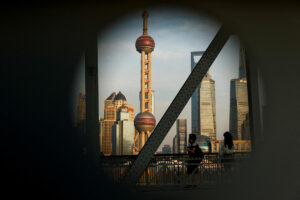THE PHILIPPINES is the least exposed to China’s economy, potentially limiting the impact of the latter’s stimulus measures, Nomura Global Markets Research said.
“Among the various uncertainties surrounding Asia’s economic outlook — US economic strength, US elections, the speed of Fed rate cuts and geopolitical tensions — China’s recent stimulus blitz is the latest addition,” it said in a report.
The report said that the Philippines and India are the least exposed within the region amid its “weak trade and investment linkages with China.”
Based on Nomura’s exposure scorecard, the Philippines has the least exposure to China’s economy with a score of 19. The scorecard assesses the potential transmission of exposure to exports, commodities, investment, and financial markets.
This is compared with India (35), Japan (54), Indonesia (79), South Korea (85), Thailand (108), Hong Kong (117) and Singapore (179). Meanwhile, Australia was seen to have the most exposure to China with a score of 190.
“The Philippines has the lowest exposure, more so in recent years, in part because, in our view, geopolitical tensions have limited foreign direct investment (FDI) inflows from China and supply chain re-orientation benefits,” it added.
Tensions between the Philippines and China have worsened in the past year as Beijing continues to block resupply missions at Second Thomas Shoal, where Manila has a handful of soldiers stationed at a World War II-era ship that it grounded in 1999 to bolster its sea claim.
In terms of monetary policy, Nomura said China’s growth outlook will weigh the most on Singapore.
“For Bank Indonesia and Bangko Sentral ng Pilipinas, which have already started their easing cycles, we expect they will remain measured in their approach and will weigh other external factors that impact FX (foreign exchange) stability, such as the Fed and geopolitical risks, more heavily than China’s growth prospects,” it said.
In August, the central bank began its easing cycle with a 25-basis-point cut. The Monetary Board is set to meet on Wednesday (Oct. 16) for its next policy review.
Nomura noted ties between China and the rest of the region have weakened in the last few years.
“China matters, but the spillovers from China to the rest of Asia have weakened over the last decade, due to a fall in Asia’s export share to China,” it said, adding that tourist arrivals from China have also dropped across Asia.
Since Sept. 24, China has announced monetary policy easing and liquidity support for equity markets. China on Saturday pledged to “significantly increase” debt to boost economic activity but lacked details on the size and timing.
Nomura sees China’s gross domestic product (GDP) growth at 4.6% this year, before slowing to 4% in 2025.
The proposed stimulus measures by China will not necessarily lead to inflationary pressures for the region, it said.
“Any China stimulus is typically seen as inflationary for Asia. However, if China stimulus is aimed more at the supply side, such as more incentives or loan support for manufacturing, this can exacerbate existing overcapacity issues over time,” Nomura said.
Nomura noted Asia’s exports to China are most sensitive to China’s property construction investment, followed by China’s retail consumption.
“If Beijing announces faster construction of infrastructure projects, then Asia may benefit less, but if fiscal stimulus is announced for property and this propels property investment higher, it could broaden Asia’s exports recovery and lift commodity prices,” it said.
Nomura said it is unclear if China’s current stimulus measures will lead to a sustained economic recovery, but noted there will be market and currency spillovers.
“In the short term, our equity strategists note that there is a possibility of further rotation, as investors fund their reallocations to China to more neutral weightings by cutting back on India, ASEAN (Association of Southeast Asian Nations) and even Korea,” it said.
The report was authored by Nomura research analysts Euben Paracuelles, Sonal Varma, Andrew Ticehurst, Jeong Woo Park, Si Yung Toh, Aurodeep Nandi, Charnon Boonnuch, Nabila Amani and Yiru Chen. — Luisa Maria Jacinta C. Jocson


















